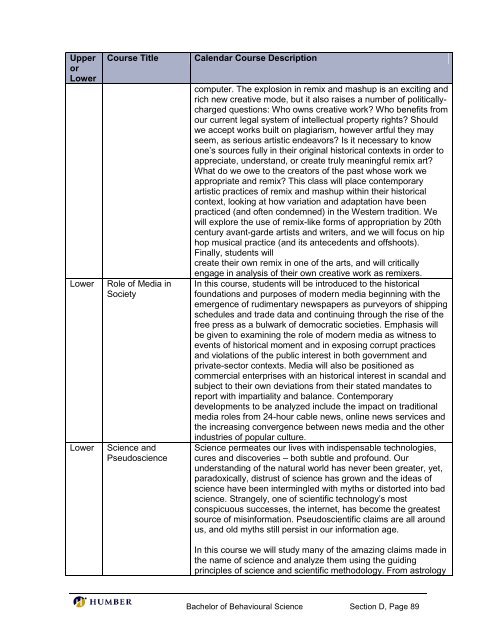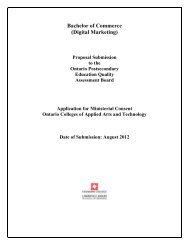Bachelor of Behavioural Science - Postsecondary Education Quality ...
Bachelor of Behavioural Science - Postsecondary Education Quality ...
Bachelor of Behavioural Science - Postsecondary Education Quality ...
Create successful ePaper yourself
Turn your PDF publications into a flip-book with our unique Google optimized e-Paper software.
Upper<br />
or<br />
Lower<br />
Lower<br />
Lower<br />
Course Title<br />
Role <strong>of</strong> Media in<br />
Society<br />
<strong>Science</strong> and<br />
Pseudoscience<br />
Calendar Course Description<br />
computer. The explosion in remix and mashup is an exciting and<br />
rich new creative mode, but it also raises a number <strong>of</strong> politicallycharged<br />
questions: Who owns creative work Who benefits from<br />
our current legal system <strong>of</strong> intellectual property rights Should<br />
we accept works built on plagiarism, however artful they may<br />
seem, as serious artistic endeavors Is it necessary to know<br />
one‘s sources fully in their original historical contexts in order to<br />
appreciate, understand, or create truly meaningful remix art<br />
What do we owe to the creators <strong>of</strong> the past whose work we<br />
appropriate and remix This class will place contemporary<br />
artistic practices <strong>of</strong> remix and mashup within their historical<br />
context, looking at how variation and adaptation have been<br />
practiced (and <strong>of</strong>ten condemned) in the Western tradition. We<br />
will explore the use <strong>of</strong> remix-like forms <strong>of</strong> appropriation by 20th<br />
century avant-garde artists and writers, and we will focus on hip<br />
hop musical practice (and its antecedents and <strong>of</strong>fshoots).<br />
Finally, students will<br />
create their own remix in one <strong>of</strong> the arts, and will critically<br />
engage in analysis <strong>of</strong> their own creative work as remixers.<br />
In this course, students will be introduced to the historical<br />
foundations and purposes <strong>of</strong> modern media beginning with the<br />
emergence <strong>of</strong> rudimentary newspapers as purveyors <strong>of</strong> shipping<br />
schedules and trade data and continuing through the rise <strong>of</strong> the<br />
free press as a bulwark <strong>of</strong> democratic societies. Emphasis will<br />
be given to examining the role <strong>of</strong> modern media as witness to<br />
events <strong>of</strong> historical moment and in exposing corrupt practices<br />
and violations <strong>of</strong> the public interest in both government and<br />
private-sector contexts. Media will also be positioned as<br />
commercial enterprises with an historical interest in scandal and<br />
subject to their own deviations from their stated mandates to<br />
report with impartiality and balance. Contemporary<br />
developments to be analyzed include the impact on traditional<br />
media roles from 24-hour cable news, online news services and<br />
the increasing convergence between news media and the other<br />
industries <strong>of</strong> popular culture.<br />
<strong>Science</strong> permeates our lives with indispensable technologies,<br />
cures and discoveries – both subtle and pr<strong>of</strong>ound. Our<br />
understanding <strong>of</strong> the natural world has never been greater, yet,<br />
paradoxically, distrust <strong>of</strong> science has grown and the ideas <strong>of</strong><br />
science have been intermingled with myths or distorted into bad<br />
science. Strangely, one <strong>of</strong> scientific technology‘s most<br />
conspicuous successes, the internet, has become the greatest<br />
source <strong>of</strong> misinformation. Pseudoscientific claims are all around<br />
us, and old myths still persist in our information age.<br />
In this course we will study many <strong>of</strong> the amazing claims made in<br />
the name <strong>of</strong> science and analyze them using the guiding<br />
principles <strong>of</strong> science and scientific methodology. From astrology<br />
<strong>Bachelor</strong> <strong>of</strong> <strong>Behavioural</strong> <strong>Science</strong> Section D, Page 89
















